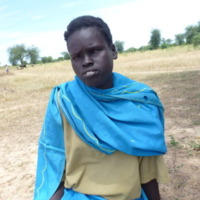
Yar Dut Yai
There are an estimated 465,000 people living in modern slavery in Sudan (GSI 2018). Between 1983 and 2005, the central government of Sudan enslaved tens of thousands of black South Sudanese Christian and traditionalist people. It was part of a genocidal war against South Sudan, with a simple aim: to force South Sudan to become Arab and Muslim. Yar Dut Yai was taken from their home in Sudan and enslaved by a family. They were beaten, verbally abused, and forced to become Muslim.
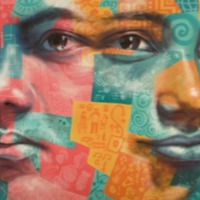
Angelica
There are an estimated 4,000 people living in modern slavery in Qatar (GSI 2018). Qatar is a destination country for men and women subjected to forced labour and, to a much lesser extent, forced prostitution. Men and women from Nepal, India, Pakistan, Bangladesh, the Philippines, Indonesia, Sri Lanka, Sudan, Kenya, Nigeria, Uganda, and other countries voluntarily migrate to Qatar as unskilled laborers and domestic workers, often paying illegal and exorbitant fees to unscrupulous recruiters in the labour-sending countries, thereby increasing their vulnerability to debt bondage. Some workers subsequently face conditions indicative of involuntary servitude, to include restricted movement, payment withholding, passport confiscation, exit permit retention, and threats of deportation or abuse. Individuals in Qatar sell visas to migrants and occasionally demand regular payments, enabling migrant workers to work illegally and without legal recourse against their respective sponsors, although reportedly this trend is on the decline. ‘Angelica’ was 49 years old when she travelled outside of the Philippines for the first time in 2011. She was married and had three children. Her employers were a married couple. They would often fight, Angelica said, and the husband would throw things at his wife. She was paid every month and would send the money home to her family. For the first month she was paid 730 riyals [US$200] and then 750 riyals [US$205] every month after that. The contract she had signed promised that she would earn US$400 per month.
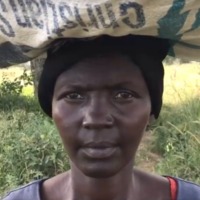
Adut Ageny
There are an estimated 465,000 people living in modern slavery in Sudan (GSI 2018). Between 1983 and 2005, the central government of Sudan enslaved tens of thousands of black South Sudanese Christian and traditionalist people. It was part of a genocidal war against South Sudan, with a simple aim: to force South Sudan to become Arab and Muslim. Adut Ageny was abducted from her village and held in enslavement for five years when she was a child.
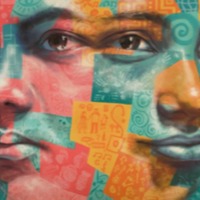
Ifunanya
There are an estimated 1,386,000 people living in modern slavery in Nigeria (GSI 2018). Since 2009, Nigeria’s homegrown Islamist insurgent movement, Jama’atu Ahlis Sunna Lidda’awati wal-Jihad, popularly known as Boko Haram, which means “Western Education is Forbidden,” has waged a violent campaign against the Nigerian government in its bid to impose Islamic law. The attacks have increasingly targeted civilians, mainly in the northeastern states of Borno, Yobe, and Adamawa. Borno State, the birthplace of Boko Haram, has suffered the highest number of attacks. A range of issues, including widespread poverty, corruption, security force abuse, and longstanding impunity for a range of crimes have created fertile ground in Nigeria for militant armed groups like Boko Haram.In some cases, women and children are abducted from predominantly Christian areas and forced to convert to Islam. These abductions took place most often in Boko Haram’s then-strongholds of Maiduguri, the Borno State capital, or Damaturu, the capital of neighboring Yobe State. In most of the documented cases, married women were abducted as punishment for not supporting the group’s ideology, while unmarried women and girls were taken as brides after insurgents hastily offered a dowry to the families, who feared to resist. Ifunanya* was abducted in 2013 and spent four weeks with Boko Haram.
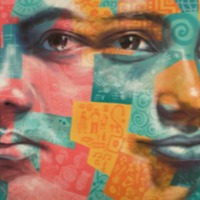
Mary
There are an estimated 1,386,000 people living in modern slavery in Nigeria (GSI 2018). Since 2009, Nigeria’s homegrown Islamist insurgent movement, Jama’atu Ahlis Sunna Lidda’awati wal-Jihad, popularly known as Boko Haram, which means “Western Education is Forbidden,” has waged a violent campaign against the Nigerian government in its bid to impose Islamic law. The attacks have increasingly targeted civilians, mainly in the northeastern states of Borno, Yobe, and Adamawa. Borno State, the birthplace of Boko Haram, has suffered the highest number of attacks. A range of issues, including widespread poverty, corruption, security force abuse, and longstanding impunity for a range of crimes have created fertile ground in Nigeria for militant armed groups like Boko Haram.In some cases, women and children are abducted from predominantly Christian areas and forced to convert to Islam. These abductions took place most often in Boko Haram’s then-strongholds of Maiduguri, the Borno State capital, or Damaturu, the capital of neighboring Yobe State. In most of the documented cases, married women were abducted as punishment for not supporting the group’s ideology, while unmarried women and girls were taken as brides after insurgents hastily offered a dowry to the families, who feared to resist. Mary* was raped in 2013 in a Boko Haram camp near Gwoza.
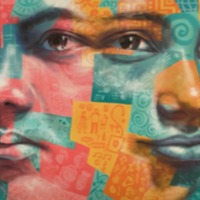
Ifedimma
There are an estimated 1,386,000 people living in modern slavery in Nigeria (GSI 2018). Since 2009, Nigeria’s homegrown Islamist insurgent movement, Jama’atu Ahlis Sunna Lidda’awati wal-Jihad, popularly known as Boko Haram, which means “Western Education is Forbidden,” has waged a violent campaign against the Nigerian government in its bid to impose Islamic law. The attacks have increasingly targeted civilians, mainly in the northeastern states of Borno, Yobe, and Adamawa. Borno State, the birthplace of Boko Haram, has suffered the highest number of attacks. A range of issues, including widespread poverty, corruption, security force abuse, and longstanding impunity for a range of crimes have created fertile ground in Nigeria for militant armed groups like Boko Haram.In some cases, women and children are abducted from predominantly Christian areas and forced to convert to Islam. These abductions took place most often in Boko Haram’s then-strongholds of Maiduguri, the Borno State capital, or Damaturu, the capital of neighboring Yobe State. In most of the documented cases, married women were abducted as punishment for not supporting the group’s ideology, while unmarried women and girls were taken as brides after insurgents hastily offered a dowry to the families, who feared to resist. 19-year-old Ifedimma* was held in a Boko Haram camp in Gwoza and was offered thousands of naira as dowry to marry one of the insurgents.
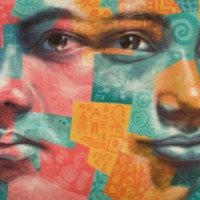
Rayowa
There are an estimated 1,386,000 people living in modern slavery in Nigeria (GSI 2018). Since 2009, Nigeria’s homegrown Islamist insurgent movement, Jama’atu Ahlis Sunna Lidda’awati wal-Jihad, popularly known as Boko Haram, which means “Western Education is Forbidden,” has waged a violent campaign against the Nigerian government in its bid to impose Islamic law. The attacks have increasingly targeted civilians, mainly in the northeastern states of Borno, Yobe, and Adamawa. Borno State, the birthplace of Boko Haram, has suffered the highest number of attacks. A range of issues, including widespread poverty, corruption, security force abuse, and longstanding impunity for a range of crimes have created fertile ground in Nigeria for militant armed groups like Boko Haram.In some cases, women and children are abducted from predominantly Christian areas and forced to convert to Islam. As an attempt to escape, some would pretend to be Muslim. Where forced conversion did not lead to the release of abductees, it usually led to forced marriage to members of Boko Haram. 38-year-old Rayowa* was abducted in April 2014 with five other Christian women and two infants.
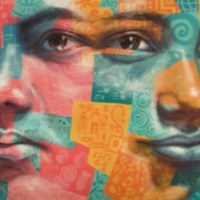
Ndidi
There are an estimated 1,386,000 people living in modern slavery in Nigeria (GSI 2018). Since 2009, Nigeria’s homegrown Islamist insurgent movement, Jama’atu Ahlis Sunna Lidda’awati wal-Jihad, popularly known as Boko Haram, which means “Western Education is Forbidden,” has waged a violent campaign against the Nigerian government in its bid to impose Islamic law. The attacks have increasingly targeted civilians, mainly in the northeastern states of Borno, Yobe, and Adamawa. Borno State, the birthplace of Boko Haram, has suffered the highest number of attacks. A range of issues, including widespread poverty, corruption, security force abuse, and longstanding impunity for a range of crimes have created fertile ground in Nigeria for militant armed groups like Boko Haram. In some cases, women and children are abducted from predominantly Christian areas and forced to convert to Islam. These abductions took place most often in Boko Haram’s then-strongholds of Maiduguri, the Borno State capital, or Damaturu, the capital of neighboring Yobe State. In most of the documented cases, married women were abducted as punishment for not supporting the group’s ideology, while unmarried women and girls were taken as brides after insurgents hastily offered a dowry to the families, who feared to resist.Ndidi*, held by Boko Haram in a camp near Gwoza, described how Boko Haram combatants placed a noose around her neck and threatened her with decapitation when she refused to renounce her religion.
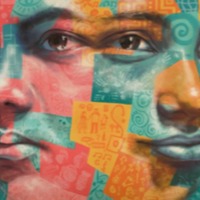
Tambara
There are an estimated 1,386,000 people living in modern slavery in Nigeria (GSI 2018). Since 2009, Nigeria’s homegrown Islamist insurgent movement, Jama’atu Ahlis Sunna Lidda’awati wal-Jihad, popularly known as Boko Haram, which means “Western Education is Forbidden,” has waged a violent campaign against the Nigerian government in its bid to impose Islamic law. The attacks have increasingly targeted civilians, mainly in the northeastern states of Borno, Yobe, and Adamawa. Borno State, the birthplace of Boko Haram, has suffered the highest number of attacks. A range of issues, including widespread poverty, corruption, security force abuse, and longstanding impunity for a range of crimes have created fertile ground in Nigeria for militant armed groups like Boko Haram.In some cases, women and children are abducted from predominantly Christian areas and forced to convert to Islam. These abductions took place most often in Boko Haram’s then-strongholds of Maiduguri, the Borno State capital, or Damaturu, the capital of neighboring Yobe State. In most of the documented cases, married women were abducted as punishment for not supporting the group’s ideology, while unmarried women and girls were taken as brides after insurgents hastily offered a dowry to the families, who feared to resist.Tambara* described how, after being abducted with her 47-year-old mother in November 2013, they were threatened with death unless they converted to Islam.